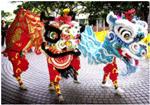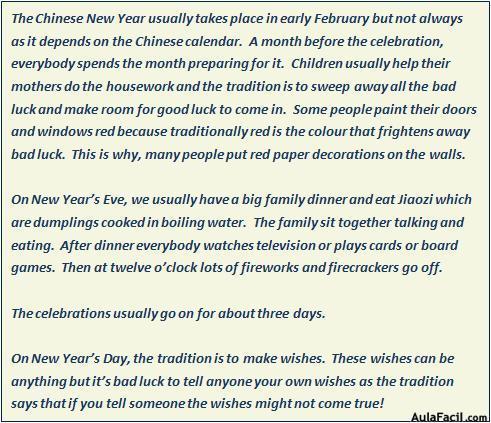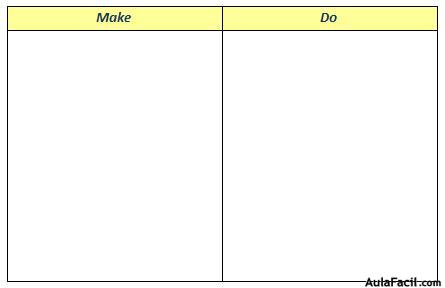Chinese New Year
1.- Introduction to lesson
In the previous lesson, we talked about different celebrations. In today’s lesson, we are going to focus on one particular celebration: Chinese New Year. We are then going to look at expressions with make or do.
2.- Your turn…
Look at the following questions and think about your answers.
- Where were you last New Year’s Eve?
- Who were you with?
- What did you do?
3.- You are going to listen to your teacher answer the above questions, note down her answers.
| 1) | ||
| 2) | ||
| 3) | ||
Corregir
Ver Solución
Limpiar | ||



3.1.- Tapescript
I spent last New Year’s Eve with my husband in Oslo. We arrived on the 30th December and stayed for a few days. The city was lovely but as it was around the Christmas period, there weren’t many shops or restaurants open. On New Year’s Eve we went for dinner in a restaurant near our hotel and after the meal we went upstairs where there was a bar and disco. We had a great evening and didn’t get home until 3am.
3.2.- Now, it’s your turn to answer the questions above!
4.- Pre-Listening Speaking Task
Look at the following pictures. Do you know which event is being shown?



- The event being shown is… Chinese New Year!
5.- Listening Activity
5.1.- You are now going to listen to a reporter talk about Chinese New Year. Before listening, look at the following questions about Chinese New Year and see if you can predict the answers.
| 1) | When does Chinese New Year take place? | |
| 2) | What do the Chinese do a month before New Year? | |
| 3) | What is the traditional New Year´s Eve dinner? | |
| 4) | Who do the Chinese usually spend their New Year´s eve with? | |
| 5) | What do the Chinese usually do on New Year´s Eve? | |
| 6) | What do the cinese usually do at midnight? | |
Corregir
Ver Solución
Limpiar | ||
Sonido
Were your predictions correct?
5.2.- Listen again and answer the questions with the correct answers.
6.- Response to Listening - Speaking Activity
You have now heard how and when the Chinese celebrate New Year’s in their country. Not it’s your turn! Complete these sentences about New Year’s Eve celebrations in your own country:
- New Year takes place…
- Just before New Year, people…
- The traditional New Year’s Eve dinner is…
- People usually spend New Year’s Eve with…
- On New Year’s Eve people…
- At midnight on New Year’s Eve people…
7.- Language Focus: Make and Do
We are now going to focus our attention on phrases with make and do.
7.1.- Look at the tapescript and pick out two phrases with make and do (one with make and one with do).
Tapescript
(Para ver la solución hacer doble click en texto; un click vuelve a posición original)

7.2.- Explanation
a) Do
We use the verb "do" when someone performs an action, activity or task. For example:
- Do the washing up
- Do homework
b) Make
We use "make" when someone constructs, builds or creates something. For example:
- Make breakfast
- Make a cake
8.- Controlled Practice
8.1.- Complete the sentences with the correct form of either make or do.
| 1) | She always the washing on Saturday mornings. | |
| 2) | Can you me a cup of tea! I´m really thirsty! | |
| 3) | Her mum is a dressmaker and she her own clothes. | |
| 4) | Last weekend Abi and Rob us a lovely dinner. | |
| 5) | On Fridays, the whole office finds it difficult to their work. | |
| 6) | I hate the ironing. | |
Corregir
Ver Solución
Limpiar | ||
Despite, the rules shown above, there are some common expressions with make and do. You will have to learn these.
- make friends (with)
- make a mistake
- make a decision
- make a difference
- make a comment
- make some money
- make a contract
- make a good footballer
- make happy/angry/sad, etc.
Here are some common expressions with do.
- do badly
- do business
- do the dishes
- do a favour
- do a degree
- do harm
- do time - (to go to prison)
- do well
- do your best
- do your hair/hair
- do your worst
8.2.- Look at the following nouns and decide if they collocate with make or do. Use your dictionary if necessary.
a comment / a decision / a degree / a job / a mistake / a noise
a profit / a suggestion / some research / sure
arrangements / money / progress / some exercise
(Para ver la solución hacer doble click en la tabla; un click vuelve a posición original)

9.- Free Practice – Your turn…
Choose six collocations with make and do and make sentences out loud that are true for you.
For example:
- I have made an arrangement to meet my cousin in London on Friday night.

